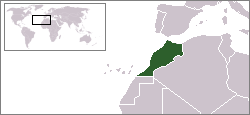LGBT rights in Morocco
From Wikipedia, the free encyclopedia
| LGBT rights in Morroco | |
|---|---|
 Morocco |
|
| Same-sex sexual activity legal? | Illegal[1] |
|
Penalty:
|
6 months to 3 years imprisonment, fine[1] |
| Gender identity/expression | - |
Lesbian, gay, bisexual, and transgender (LGBT) persons in Morocco (including the 80 percent of Western Sahara controlled by Morocco) face legal challenges not experienced by non-LGBT residents. Both male and female same-sex sexual activity is illegal in Morocco. Morocco's statute and culture towards LGBT issues stands in stark contrast to neighboring Spain.
Contents |
[edit] Laws against homosexuality
Article 489 of the Penal Code of Morocco criminalizes “lewd or unnatural acts with an individual of the same sex.”[2]. Homosexuality is illegal in Morocco and can be punished with anything from 6 months to 3 years imprisonment and a fine of 120 to 1200 dirhams[3][4]. However, the law is rarely enforced by authorities[5], and homosexual activity is fairly common, especially in the holiday resorts like Marrakesh<[6]Relationships are often visibly displayed and money often plays a role where sex is involved. In the community homosexuality remains a taboo in this predominantly Islamic region [7] and is considered immoral.
The Morrocan Government's attitudes towards homosexuality has been highlighted in several reports. Most noticably, it has banned books on homosexuality, introduced a teaching curriculum that "emphasises...the danger and depravity of "unatural acts"; and opposed the participation of an International Gay and Lesbian Rights Representative at the 2001 United Nations Conference on AIDS[8]
Moreover, on the 21st March 2008, a statement issued by the Ministry of Interior on March 21st revealed the full scope of the government's agenda: to "preserve citizens' ethics and defend our society against all irresponsible actions that mar our identity and culture"[9].
[edit] Recognition of same-sex relationships
There is no legal recognition of same-sex couples.
[edit] Discrimination protections
There is no anti-discrimination law. Even though it has been stated that some citizens of Morocco may be ambivalent to homoerotic practices, the government is still reluctant toward the issue [10].
[edit] Gender Expression
No scientific work has been performed in the transgendered field. The real transsexual subject is rarely seen as anything other than an isolated entity. They are generally confused with homosexual persons or persons with other deviant behavior. Casablanca has been known for a long time as a city where transsexuals came from all over the world for sex change surgery. Although available, these operations were always practiced in a clandestine way[11]
However, cases do arise in the course of psychological consultations, in which the young behave in school or during everyday life in a manner opposite their sexual identity. In the course of follow up, some of these persons experience depression syndromes because of this conflict between their sexual identity and their social identity. Management of such cases is difficult in Morocco, where there is a complete legal void concerning this clinical entity.
[edit] Living conditions
Morocco has a macho culture, with rigid gender roles that requires a male, regardless of his sexual orientation, to get married and have children [12].
A court in Ksar-el-Kebir, a small city about 120 kilometers south of Tangiers, convicted 6 men on December 10, 2007 of violating article 489 of Morocco’s penal code. However, according to lawyers for the defendants, the prosecution failed to present any evidence that the men actually had engaged in the prohibited conduct in the first place.
As of December 17, 2007, the men have been in jail since they were first arrested by the police between November 23 and 25, 2007, after a video circulated online—including on YouTube—purporting to show a private party, allegedly including the men, taking place in Ksar el-Kbir on November 18. Press reports claimed the party was a “gay marriage.” Following the arrests, hundreds of men and women marched through the streets of Ksar el-Kbir, denouncing the men’s alleged actions and calling for their punishment.[13]
Female homosexuality or sihaq is not mentioned in the Koran. It is prevalent in certain regions of Morocco, particularly the north, but remains hidden, unmentioned, and unstudied.[14]
[edit] Advocacy for LGBT rights
Kifkif is the unique associative base of the LGBT community in Morocco, established in 2004 by Moroccan gay activists, after the haltings of Tetuan, that although is not legalized, maintains certain activities. In September 2006, Kifkif asked the Department of the Interior for legal recognition of its organization, but was rejected.
[edit] See also
- Human rights in Morocco
- LGBT rights in Africa
- Human rights in Western Sahara — Morocco controls 80 percent of this disputed territory
[edit] References
- ^ a b Ottosson, Daniel (May 2008). "State-sponsored Homophobia: A world survey of laws prohibiting same sex activity between consenting adults". International Lesbian and Gay Association (ILGA). pp. Page 25. http://www.ilga.org/statehomophobia/ILGA_State_Sponsored_Homophobia_2008.pdf. Retrieved 2009-05-05.
- ^ http://www.gaywired.com/article.cfm?section=123&id=17549
- ^ http://www.unhcr.org/refworld/country,,IRBC,,MAR,456d621e2,469cd6af0,0.html
- ^ http://www.mrt-rrt.gov.au/docs/research/MAR/rr/MAR30137.pdf
- ^ http://www.mrt-rrt.gov.au/docs/research/MAR/rr/MAR30137.pdf
- ^ http://www.mrt-rrt.gov.au/docs/research/MAR/rr/MAR30137.pdf
- ^ http://www.mask.org.za/article.php?cat=morocco&id=2092
- ^ http://www.mrt-rrt.gov.au/docs/research/MAR/rr/MAR30137.pdf
- ^ http://www.magharebia.com/cocoon/awi/xhtml1/en_GB/features/awi/features/2009/03/26/feature-02
- ^ http://www.mrt-rrt.gov.au/docs/research/MAR/rr/MAR30137.pdf
- ^ http://www2.hu-berlin.de/sexology/IES/morocco.html
- ^ http://www2.hu-berlin.de/sexology/IES/morocco.html
- ^ http://www.gaywired.com/article.cfm?section=123&id=17549
- ^ http://www2.hu-berlin.de/sexology/IES/morocco.html
[edit] Bibliography
- Puterbaugh, Geoff. Africa, North. Encyclopedia of Homosexuality. Dynes, Wayne R. (ed.), Garland Publishing, 1990. pp. 19–22.
- (Italian) Patanè, Vincenzo. Arabi e noi. DeriveApprodi, 2002.
[edit] External links
- Moroccan LGBT online Community
- GayMaroc.org; Moroccan LGBT Forum
- UK government travel advice: Local laws and customs